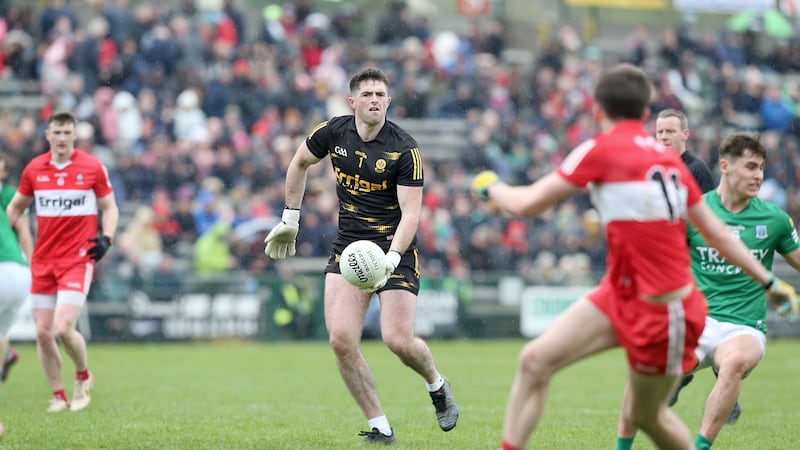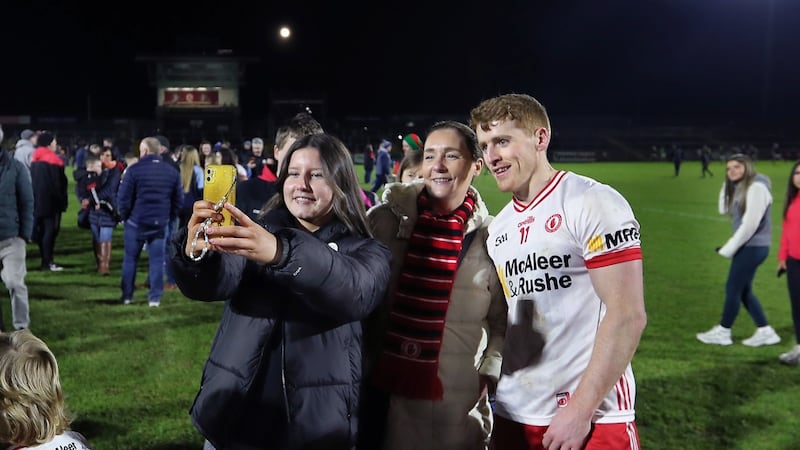SEAMUS Doran’s sports shop looked no more like what it was.
The heavy brown front door that showed itself to the street lay wide to the world in all weathers.
Its tall, pick-thin owner with the big glasses and slicked-back grey hair stood half-in, half-out, surveying the town and awaiting his next customer.
He doubled as a barber in the narrow, darkened room just inside to the right.
Virtually every young footballer within ten miles of Dungiven bought their first pair of boots there.
The Lynchs, a family of six living in Park, didn’t have much money for football boots.
Mickey was the eldest boy and the first to knock on Seamus Doran’s door.
“I won a £100 draw in Claudy school and my mother was fit to buy a pair of Adidas boots with it.”
They would become big boots to fill.
Mickey Lynch was Derry’s centre-half forward the first and only time the county has ever won back-to-back Ulster titles, in 1975 and ’76.
He was man-of-the-match in the ‘75 Ulster final against Down, scoring five points from play.
Derry were fairly roundly beaten in that year’s All-Ireland semi-final by eventual winners Dublin.
When they returned to Croke Park to meet Heffo’s Army in spring’s National League final, Lynch pulled them to within a whisker of an upset with another man-of-the-match performance, this time scoring six points from play.
A generation later, perhaps the best performance of his son Mark’s career was in scoring 1-8 against the Dubs.
Mark could be like a silhouette of his father, right down to the way he ran.
“He would have had some of the oul things he used to do. Maybe he could kick a ball better than me, he got more scores in games. I always tell him I was quicker than him,” quips Mickey.
Now the mantle lies with Odhran Lynch.
He is Mickey’s nephew and Mark’s cousin.
Odhran’s father Eamon, the youngest of the clan of four boys and two girls, won an Ulster medal with Derry in 1987 as well as All-Ireland minor and two Ulster U21 medals between ’83 and ’86.
Eugene Lynch was a county minor too, though he was troubled by a bad eye and quit playing in his early 20s.
Gerard was a speedy corner-back for Banagher for 15 years, won the club’s player of the year a few times, but never got the call.
Patrick O’Donnell, a cousin on their mother’s side, was corner-back for the minors in ’83.
Mark’s elder brother Ryan played football and hurling for the county.
It is a thread of history that Odhran Lynch will pull around St Tiernach’s Park with him.
* * * * *
Between my finger and my thumb
The squat pen rests; snug as a gun.
* * * * *
IN the car home from the first trial, and for days thereafter, Odhran Lynch was distinctly sullen.
When his Magherafelt team won an U16 championship, he was captain from the family favourite number 11 jersey.
But even by then, the transition had begun.
At 15, he wasn’t making the club minor team outfield. When their first-choice ‘keeper rolled an ankle before a game, Lynch put his hand up to volunteer, simply because it would get him on the field.
He saved a penalty that night. Kickouts were grand. And he was always a big lad.
“He has the Lynch build, the arse and the legs, but as long as there’s a bit of power in them and they can do the job,” laughs Eamon.
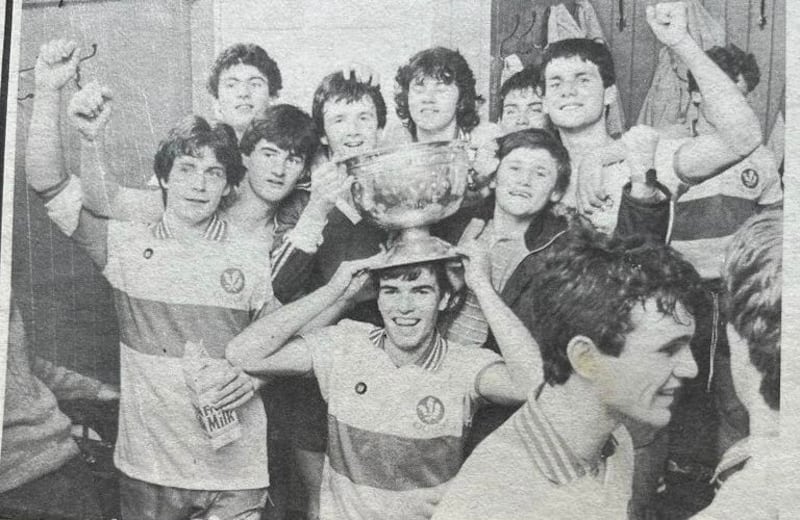
At 15, though, he hadn’t the power in them. No power meant no pace. And no pace would have meant no place on the Derry U16 development squad even though it was his father and Jude Donnelly in charge.
Seamus Scullion was their goalkeeping coach. At the end of the first trial, he convinced Odhran to come back the following week and try out in nets. That’s where he spent the year.
It had been the same story at school. Centre-forward on the St Mary’s Magherafelt teams from first year to fifth, reaching and losing finals.
When his year returned to begin their A-Levels, Kevin Brady had a big problem. His goalkeeper of five years had left school after his GCSEs and there was no obvious replacement.
The call went out for volunteers. Odhran Lynch sat in the corner of the changing room and stared hard at the tiles, hoping his eyes would bore a hole he could disappear into long enough for Brady to stalk some other helpless prey.
“He came home and told me the MacRory team had picked him as a goalkeeper and he didn’t speak to me for three or four days.
“A few months later he had won a MacRory medal. That was really the turning point.”
The Convent’s first ever MacRory success was followed by county minors, club minors and then club seniors.
He continued to resist. When Adrian Cush took over as Magherafelt manager, the first time he and Lynch spoke, it was 20 minutes of the teenager trying to say no to goalkeeping.
After a McKenna Cup draw with Tyrone in January, Rory Gallagher singled Lynch out for praise, saying he’d gone off over the winter and got himself in “great shape”.
The point he kicked against Monaghan last weekend was pure Mark Lynch in its technique.
* * * * *
By God, the old man could handle a spade.
Just like his old man.
My grandfather cut more turf in a day
Than any other man on Toner’s bog.
* * * * *
THE banging of dustbin lids reverberated through Derry in the 1970s.
That was the traditional warning that the British Army tanks were on their way. Their demeanour on arrival wasn’t exactly convivial.
Mickey Lynch served his apprenticeship as a joiner working for Gilbert-Ash in the city.
At lunchtime, he and Tom McGuinness would meet at the old Celtic Park and do runs for a bit of extra training.
“And the soldiers standing ‘round ye.”
He ended up moving on and spending almost five years as a foreman working on Housing Executive homes in Kilfennan, the Creggan, Shantallow.
The banging lids would signal a raid. That meant a day lost in whichever house they found themselves in, waiting on the troops to move out again.
“There’s none of that now thank God,” he says with typical efficiency.
Just around the time he was effectively finishing up with Derry in the mid-80s, he set up his own company with brother-in-law Lawrence O’Kane, whose son Eamonn won a boxing gold medal at the Commonwealth Games in 2010.
They’re just withdrawing their own troops from Anfield at the minute. At its peak, they had 26 men over working on the renovation at Liverpool’s stadium.
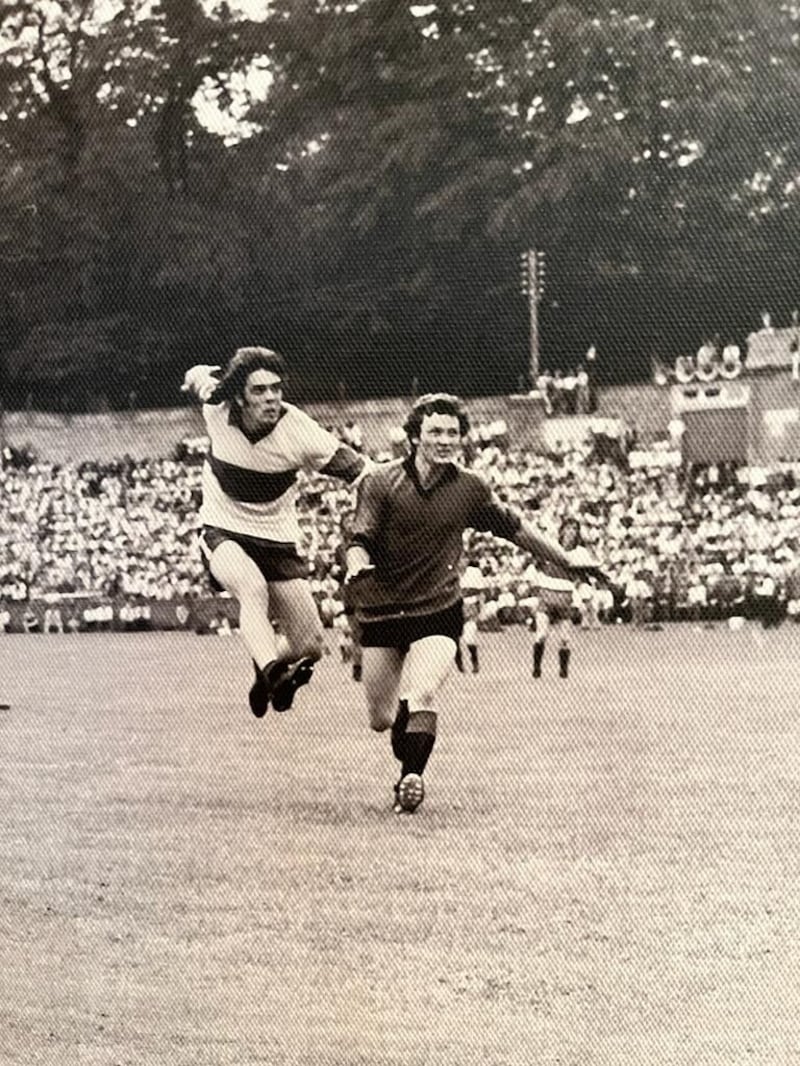
For several years they sponsored all sorts in Derry, including the club championships and adult leagues at different stages.
He might have had cause to be sore too, given how his playing career ended, but he never held it.
The only year of county football Mickey and Eamon Lynch played together was 1990.
Mickey was 35 and had been out of it for six years by then. Eamon was 25 but living and working in London, flying home at weekends and joining up with the squad.
Eamonn Coleman had come in along with Fr Sean Hegarty as manager. After a few years across the water himself, Coleman was back home and brickying for Mickey Lynch on a job at the City Airport.
Neither of them saw any great pile of football in 1990 but when it came to picking the team for the first round of the championship against Fermanagh, Mickey Lynch was to start at wing-forward.
Word came of a disciplinary hearing over a row in a club game. He’d never been sent off in his life and wasn’t that day, but had words with the referee after it.
Others got off with a warning. Mickey Lynch was banned for 12 weeks, the only suspension of his career. In a time when club and inter-county bans overlapped, that meant he was suspended for the Fermanagh game. He never went back.
His time with Derry seemed to have been book-ended six years earlier.
A dislocated knee in his mid-20s, suffered when he stood in a divot during a McKenna Cup game against Armagh, had made life increasingly difficult.
“I was nine months I couldn’t put a foot to the ground, it was completely out of joint.”
Derry won Ulster in ’75 and ’76. But the rotating draw left them against Dublin first and then Kerry. When Armagh beat them in the ’77 final, their semi-final was with Roscommon.
Mickey Lynch went to Croke Park when Armagh played their All-Ireland final against Dublin.
“It was a good enough game but all you could think about was why was it not us.”
The spark that had been there since the first night Liam Hinphey knocked on his door at home and invited him on the panel in early 1974 went out fairly soon after.
Sean O’Connell, Anthony McGurk, Peter Stevenson, Gerry O’Loughlin were all retired, Malachy McAfee went to Australia. His friend through school Gerry McElhinney, a year younger than Lynch, played his last game in 1978 before signing for Bolton Wanderers two years later.
A rebuild was required and by the time the footings were dug, Mickey Lynch had done his knee.
Eamon was full-forward on the ’83 minor team, which provided Johnny McGurk, Dermot McNicholl and Damian Cassidy to the side that won the county’s sole All-Ireland a decade later.
They won back-to-back Ulster U21 titles in ’85 and ’86.
All that was needed by Derry the following summer was a bit of a skin graft. But as others pushed on in footballing terms, Eamon followed his line of work in the food industry to England’s capital city. He was there from 1988 until the end of ’91, at which point he came home, got married to Siobhan and bought a house in Magherafelt.
The Lynchs are staunch Banagher people. Mickey was born and lived his first few years very much on the Craigbane side of the Faughan River in Park, attending school at the now-closed Kilgort Primary.
But the family moved down to Altinure Cottages, across on the Banagher side of the water, before the others were at school.
The 18-house estate backed on to Altinure primary school.
Derry and Glen great Seamus Lagan, and former Trillick and Tyrone player Paddy Donnelly were the two male teachers and they gave the younger Lynch siblings an earlier foot-up in the sport than Mickey had.
There was no TV in most houses, theirs included. When Mickey Lynch was thrice nominated for Allstars in ’75, ’76 and ‘79, he had to go elsewhere to collect the disappointing call that let him know that he’d been overlooked.
Francie Donaghy drove pretty much the same load of men to training every night – Mickey, Liam Hinphey, Gerry McElhinney, Fintan McCloskey and Liam Murphy.
“You’d have went to Ballinascreen or Bellaghy and then to Timoney’s in Draperstown after for a bottle of milk.”
Meanwhile, in the field across the road from them, every male between the ages of seven and 17 spent any half-decent evening thrashing through it after a ball.
“There was nothing else, football was the outlet. We grew up knowing nothing else and my life has revolved largely around football ever since,” says Eamon.
“Park, early 70s, a wee nationalist village in the start of the Troubles, cut off from it.
“Your parents would have watched the six o’clock news and other than that, you didn’t have much idea what was going on in the outside world.
“I went to university and spent three or four years in Belfast, and we didn’t have a phone in the house. I was 7 or 8 before we had a TV.
“And I had a great childhood because we had the craic and played football all the time. We had absolutely nothing but we didn’t realise it because nobody around us had anything either.”
* * * * *
But I’ve no spade to follow men like them.
Between my finger and my thumb
The squat pen rests.
I’ll dig with it.
* * * * *
WHEN Mark Lynch was 14, he suffered a bad bout of glandular fever.
The following year he had a relapse, which left him bedridden for a while.
That was the genesis of the story that he was asthmatic, which followed him through his entire playing career despite having no substance.
Like his father, he had a head-down running style that powered him through men.
He starred in the run to the 2002 All-Ireland minor title. He and Patsy Bradley were the only two to graduate in time to play in the All-Ireland semi-final two years later.
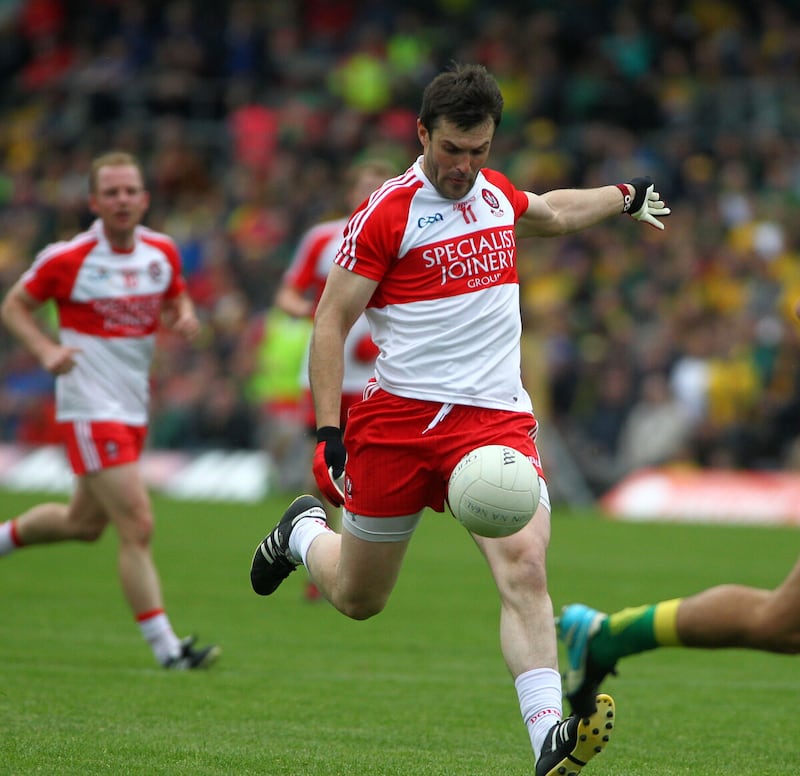
A National League title followed under Paddy Crozier, beating Kerry in Parnell Park, but championship success was never came.
Retiring after almost 15 years with no other silverware seemed a stingy payment considering the service he gave and the quality of players Derry had at the time.
In early 2020, Mark was diagnosed with testicular cancer. Thankfully he was aware of the symptoms and doctors caught it early. He’s in remission and back patrolling things for Banagher from centre-back, the position in which he made his name on his father’s underage teams at the club.
“The two of them are ridiculously alike, in so many ways,” says Eamon.
“Mark is just a chip off the old block. Same sort of character, a man of his word – if he tells you he’ll do it, it’ll be done.
“I get asked by people which of the two was the better footballer. It’s really difficult to answer that. There was nothing in it.
“They were a similar build, both direct runners – they were unbelievably similar in every aspect.”
Now Odhran carries on the family name.
Mickey Lynch was the touch-paper for the generation that came after him and won an All-Ireland.
“He was my hero,” says Eamon.
“I as an eight, nine-year-old wanted to be in the back of the car with him no matter where he went. Going to matches.
“Once or twice a year it might have happened on a good weekend, the boys would have landed up to Portstewart or Benone to the beach, and you moaned and groaned enough ‘til you got in the car with them.
“Back then I would have been known as Mickey Lynch’s brother. Now I’m Lynchy’s Da.”
The name is woven deep through the tradition and history of Derry football.
Goalkeeping is the squat pen with which Odhran Lynch digs.
_________________
Poem: Digging by Seamus Heaney
